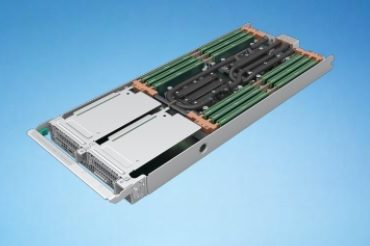Penguin Computing Brings Cascade Lake-AP to OCP Form Factor

On Monday (July 6), Penguin Computing, a subsidiary of SMART Global Holdings, Inc., introduced a new Tundra server, Tundra AP, that is the first to implement the Intel Xeon Scalable 9200 series processors (codenamed Cascade Lake-AP) in the Open Compute Project (OCP) form factor. With support for the 32-, 48- or 56-core 9200-series processors, the Tundra AP server, Relion XO1122eAP, can support up to 7,616 CPU cores per OCP rack.
 The Tundra AP chassis accommodates current Intel server system compute modules — S9256WK1HLC, S9248WK1HLC and S9232WK1HLC — with support for the Xeon Platinum 9222, 9242 and 9282 SKUs, ranging from 250-400 watts.
The Tundra AP chassis accommodates current Intel server system compute modules — S9256WK1HLC, S9248WK1HLC and S9232WK1HLC — with support for the Xeon Platinum 9222, 9242 and 9282 SKUs, ranging from 250-400 watts.
Higher density, greater power capacity and efficiency, improved serviceability, and room-neutral cooling via integrated direct-to-chip liquid cooling are among the benefits that Penguin Computing and Intel are attributing to the new form factor.
The 21″ OCP form factor facilitates nearly double the power capacity of a standard 19” form factor, according to Penguin. Tundra AP allows for up to 15 percent more nodes per rack compared to a traditional EIA rack with the same footprint, the company notes.
 Penguin also highlighted ease of serviceability. “Access to the hot aisle side of the rack is not required for service and the disaggregated power configuration allows for the quick exchange of servers,” the company said.
Penguin also highlighted ease of serviceability. “Access to the hot aisle side of the rack is not required for service and the disaggregated power configuration allows for the quick exchange of servers,” the company said.
“Tundra AP and the new Relion XO1122eAP system is a great example of how Intel and Penguin Computing bring together leading HPC and AI technologies in an OCP form factor,” said Trish Damkroger, GM and Vice President of Intel’s HPC Business Group. “Through this partnership, customers with a broad range of compute workloads can access the leading performance of Intel Xeon Scalable 9200 series processors.”
Penguin introduced the Tundra line in 2015 to meet the scalability and performance needs of high-performance computing workloads within an OCP hardware design, and has evolved the platform to meet increased demand for AI training and inference.
Penguin also supports the Intel Xeon Scalable 9200 series processors in standard 19″ racks with its Relion XE2122eAP and XE2142eAP compute servers. Lawrence Livermore National Laboratory’s Magma supercomputer encompasses 730 XE2142eAP compute nodes, each equipped with dual Xeon Platinum 9242 (48-core) processors, providing 293TB of system memory. A 650-node configuration placed 79th on the latest Top500 list, providing 3.24 Linpack petaflops out of a theoretical peak of 4.6 petaflops.
Launched a year ago, Intel’s Cascade Lake-AP processors support up to 56 cores in a multi-chip module (two dies, one package), and deliver up to 3.2 double-precision Linpack teraflops (out of a theoretical 4.7 double-precision teraflops). With 12 channels of memory (six per die), the 9200 offers the highest DDR4 native memory bandwidth support of any Intel Xeon processor platform.
Penguin anticipates it will begin shipping Tundra AP systems in September 2020.










